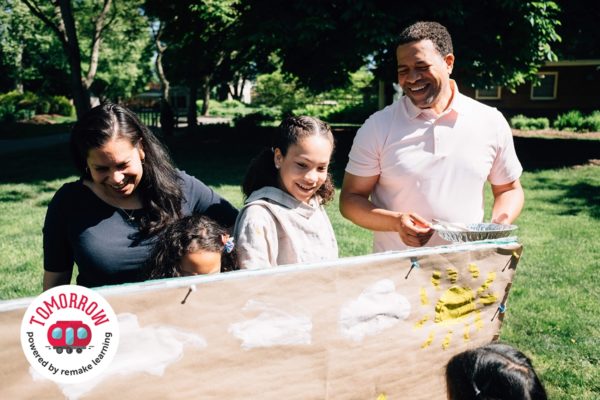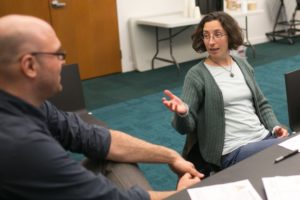
Beyond Reopening Schools: How to grow connections between families and schools
By Melissa Rayworth
Maybe you’ve been there: During a tightly scheduled day of parent/teacher conferences, you linger in a school hallway until you’re admitted to your child’s classroom. Wedging your adult-sized frame into an awkwardly small chair, you’re plunged into a rapid-fire summary of your child’s work.
Acronyms and references to standardized tests fly through the air. You have questions but you’re acutely aware of the backup of other parents out in the hallway, all as pressed for time as you.
Rebecca Winthrop, co-director of the Center for Universal Education at the Brookings Institution, has sat through meetings like this herself during her own children’s school years. She had those moments in mind earlier year when she and her team at Brookings’ Center for Universal Education started research into the engagement and communication that happens — or doesn’t happen — between parents and schools.
In early 2020, before COVID-19 had begun disrupting school worldwide, they reached out to a diverse group of districts in 10 countries, including more than a dozen U.S. school communities. From the start, they heard the same message from all participants: Much as they wish it were different, parents and schools don’t really communicate or collaborate well.
Teachers often feel blamed when students aren’t doing well. And they’re faced with an array of parents who all want and expect different things. Some parents have power in a community while others do not, so interactions are fraught with unseen imbalances.
Parents, on the other hand, often have no clear methods for engaging with their child’s teachers. Or “the ways they’re being asked to engage are just absolutely impossible for their daily life,” Winthrop says. They want to be helpful to their child’s teachers, “but don’t know how, and they are feeling really disempowered.”
COVID-19, of course, dramatically disrupted schooling worldwide. But one encouraging trend began to blossom just as the Brookings research was beginning: Schools and parents began talking to each other in new ways. It was messy and imperfect, but various kinds of partnerships and collaborations sprouted up in districts around the globe.
An atmosphere of mutual support soon emerged. Pitching in as co-teachers at home gave parents a deeper sense of the challenges that educators face every day. And from the U.S. to Botswana to India, “people in charge of delivering education services were saying, ‘Wow, I didn’t realize how capable parents are,” Winthrop says.
Just one anecdote: “Societies are recognizing that schools and teachers are heroes,” an Argentine government official named Gabriel Zinny told Brookings. As people in cities around the world stood on balconies at night to applaud doctors and nurses, Zinny said, families in Buenos Aires also applauded their nation’s teachers.

In response to all of this, the team at Brookings has begun to ask: How might education emerge from the coronavirus pandemic even stronger? Could the world’s communities build something even better than before by expanding on trends like the sudden increase in communication between families and schools?
An initial report on that research has been released this week. This big-picture overview titled Beyond Reopening Schools: How Education Can Emerge Stronger Than Before COVID-19 mentions the importance of encouraging and building on the newfound communication and collaboration between parents and schools.
The pandemic has galvanized parts of communities that traditionally are not actively involved in children’s education,” the report says. “As school buildings closed, teachers began to partner with parents in ways never done before, schools formed new relationships with community health and social welfare organizations, media companies worked with education leaders, technology companies partnered with nonprofits and governments, and local nonprofits and businesses contributed to supporting children’s learning in new ways.
One key finding: Communities around the world are finding creative ways to connect with parents via technology.
“Creative mechanisms for real-time guidance to parents on their children’s education are popping up around the globe using the low-tech — but, in many places, ubiquitous — ability to make a phone call,” the report finds.
This summer in the U.S., the report mentions, the Pittsburgh Learning Collaborative (PLC) created a family hotline to help provide parents and families with advice and resources to assist with their children’s learning. The PLC, a coalition of more than 70 organizations serving families and children, received 1,000 calls to the hotline in just its first month of operation.
Another great way to connect with families: Building a local learning ecosystem where the whole community contributes to children’s education. These webs of collaboration between schools, community organizations, businesses and government agencies increase the learning opportunities available to young people while helping schools and parents share the challenge of educating kids.
For more than a decade, the Pittsburgh region has been developing a learning ecosystem called the Remake Learning network.
Like Pittsburgh, other jurisdictions in Brookings’ Parent Engagement Network are eager to strengthen schools by bringing community resources alongside to help children’s learning. That kind of information sharing is a priority of the Brookings project.
COVID-19 has challenged educators and families on myriad levels. But in this unique period of experimentation and discovery, the Brookings research team will continue exploring the possibilities that have begun emerging.
“It is hard to imagine there will anytime soon be another moment in history when the central role of education in the economic, social, and political prosperity and stability of nations is so obvious and well understood by the general population,” the report says.
“Education leaders across the globe are finding out just what powerful allies parents can be in their children’s learning, including parents from the most marginalized communities.”
This article is part of a series for “Tomorrow” powered by Remake Learning. From May to October, “Tomorrow” will explore – through virtual events, grantmaking, and storytelling – what we can do today to make tomorrow a more promising place for all learners. Follow along or share your hopes for today’s young people using the hashtag #RemakeTomorrow and tagging @RemakeLearning. Learn more about Remake Learning here. And read more “Tomorrow” articles published on Kidsburgh.